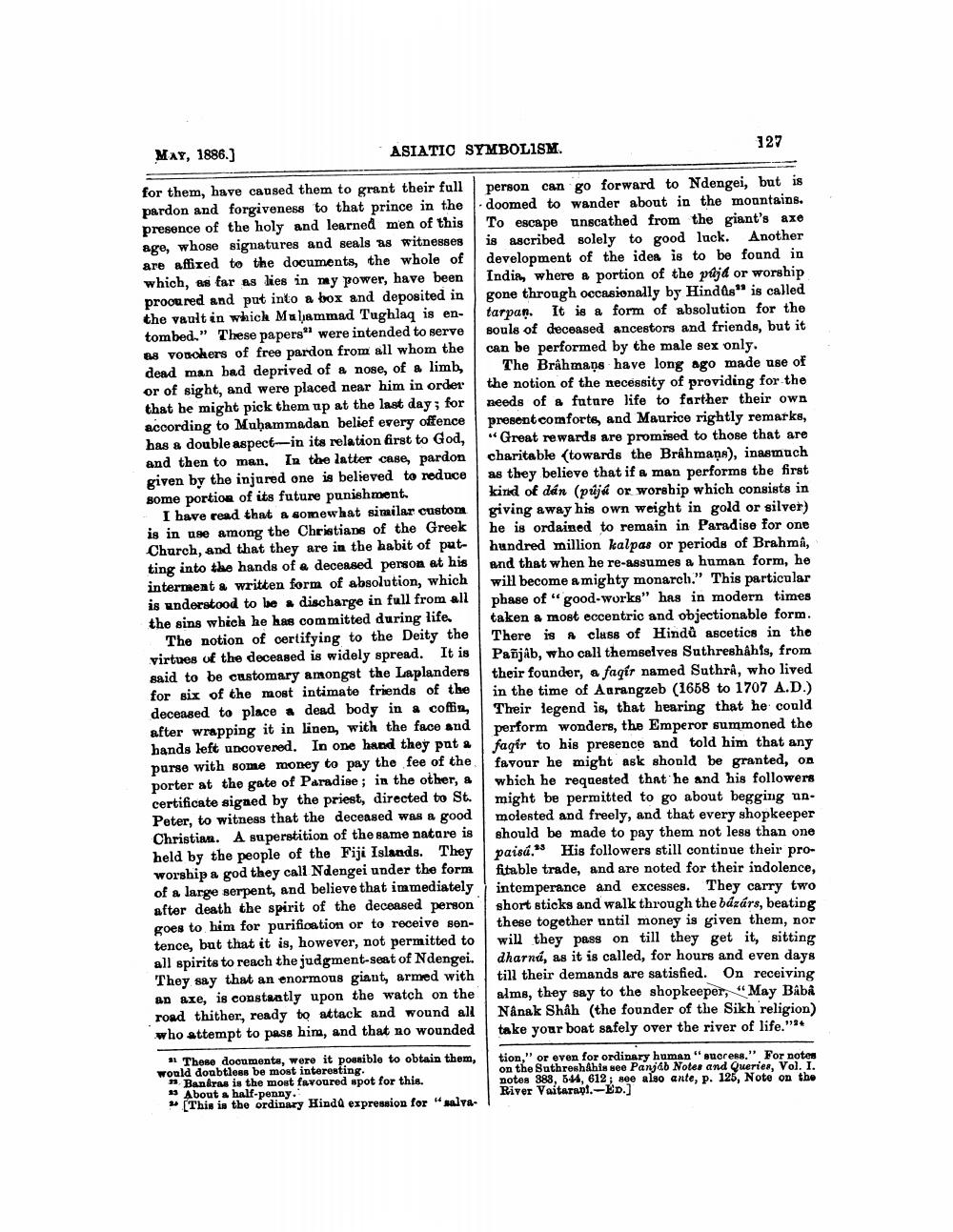________________
ASIATIC SYMBOLISM.
MAY, 1886.]
for them, have caused them to grant their full pardon and forgiveness to that prince in the presence of the holy and learned men of this age, whose signatures and seals as witnesses are affixed to the documents, the whole of which, as far as lies in my power, have been procured and put into a box and deposited in the vault in which Muhammad Tughlaq is entombed." These papers were intended to serve as vonchers of free pardon from all whom the dead man bad deprived of a nose, of a limb, or of sight, and were placed near him in order that he might pick them up at the last day; for according to Muhammadan belief every offence has a double aspect-in its relation first to God, and then to man. In the latter case, pardon given by the injured one is believed to reduce some portion of its future punishment.
I have read that a somewhat similar custom is in use among the Christians of the Greek Church, and that they are in the habit of putting into the hands of a deceased person at his interment a written form of absolution, which is understood to be a discharge in full from all the sins which he has committed during life.
The notion of certifying to the Deity the virtues of the deceased is widely spread. It is said to be customary amongst the Laplanders for six of the most intimate friends of the deceased to place a dead body in a coffin, after wrapping it in linen, with the face and hands left uncovered. In one hand they put a purse with some money to pay the fee of the porter at the gate of Paradise; in the other, a certificate signed by the priest, directed to St. Peter, to witness that the deceased was a good Christian. A superstition of the same nature is held by the people of the Fiji Islands. They worship a god they call Ndengei under the form of a large serpent, and believe that immediately after death the spirit of the deceased person goes to him for purification or to receive sentence, but that it is, however, not permitted to all spirits to reach the judgment-seat of Ndengei. They say that an enormous giant, armed with an axe, is constantly upon the watch on the road thither, ready to attack and wound all who attempt to pass him, and that no wounded
31 These documents, were it possible to obtain them, would doubtless be most interesting.
Bandras is the most favoured spot for this.
33 About a half-penny.
[This is the ordinary Hindû expression for "salva
127
person can go forward to Ndengei, but is doomed to wander about in the mountains. To escape unscathed from the giant's axe Another is ascribed solely to good luck. development of the idea is to be found in India, where a portion of the pujd or worship gone through occasionally by Hindus" is called tarpan. It is a form of absolution for the souls of deceased ancestors and friends, but it can be performed by the male sex only.
The Brahmans have long ago made use of the notion of the necessity of providing for the needs of a future life to farther their own present comforte, and Maurice rightly remarks, "Great rewards are promised to those that are charitable (towards the Brahmans), inasmuch as they believe that if a man performs the first kind of dán (pujú or worship which consists in giving away his own weight in gold or silver) he is ordained to remain in Paradise for one hundred million kalpas or periods of Brahmâ, and that when he re-assumes a human form, he will become a mighty monarch." This particular phase of "good-works" has in modern times taken a most eccentric and objectionable form. There is a class of Hindû ascetics in the Panjab, who call themselves Suthreshâhis, from their founder, a faqir named Suthrâ, who lived in the time of Aurangzeb (1658 to 1707 A.D.) Their legend is, that hearing that he could perform wonders, the Emperor summoned the faqir to his presence and told him that any favour he might ask should be granted, on which he requested that he and his followers might be permitted to go about begging unmolested and freely, and that every shopkeeper should be made to pay them not less than one paisú. His followers still continue their profitable trade, and are noted for their indolence, intemperance and excesses. They carry two short sticks and walk through the bázárs, beating these together until money is given them, nor will they pass on till they get it, sitting dharnú, as it is called, for hours and even days till their demands are satisfied. On receiving alms, they say to the shopkeeper, "May Baba Nanak Shah (the founder of the Sikh religion) take your boat safely over the river of life."'"*
tion," or even for ordinary human "sucress." For notes on the Suthreshâhis see Panjab Notes and Queries, Vol. I. notes 388, 544, 612; see also ante, p. 125, Note on the River Vaitarapi.-ED.]




